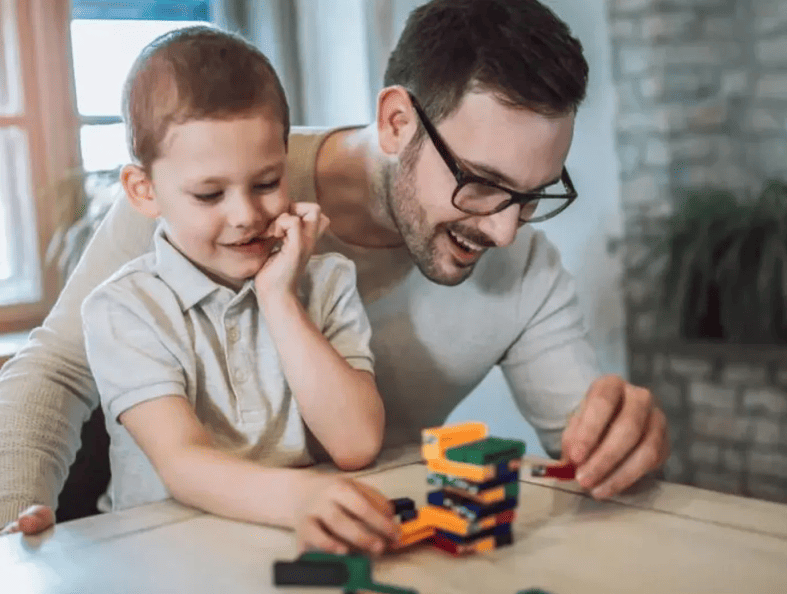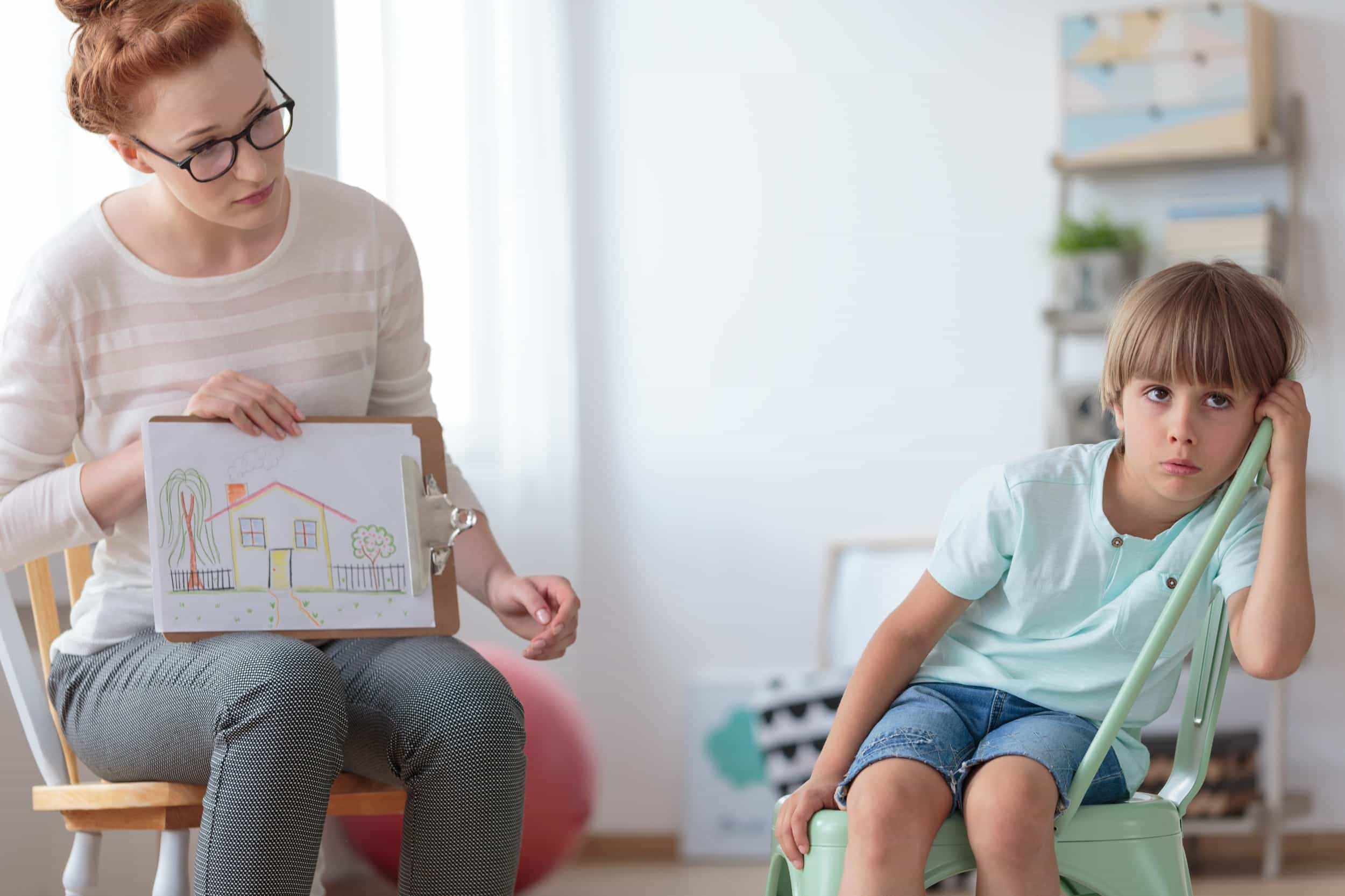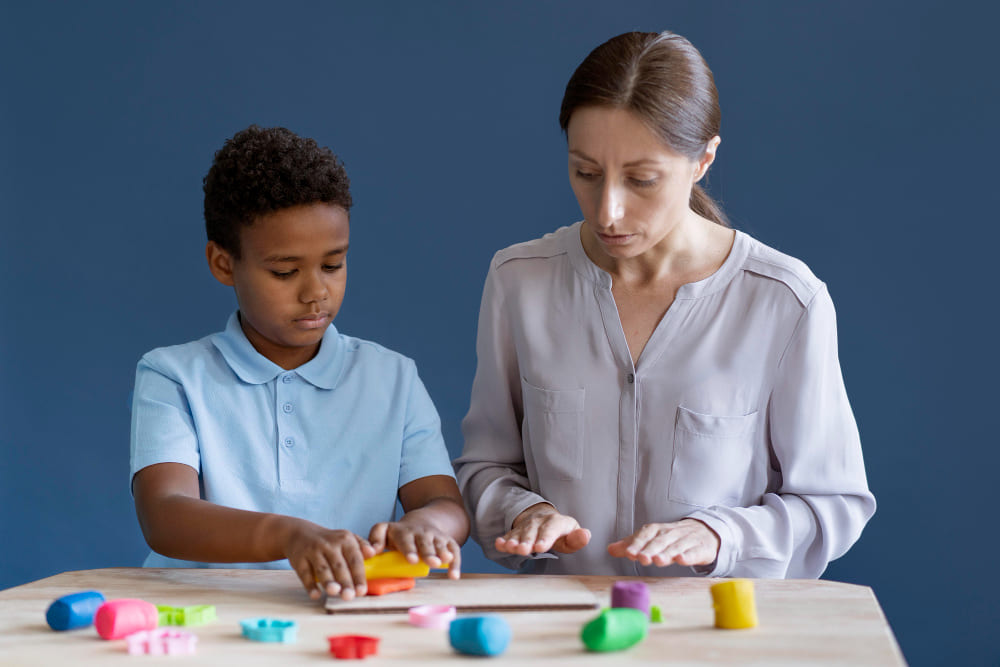autism-spectrum-disorder works!
Talk to us about
Helping children on the autism spectrum communicate with clarity and confidence.

What is Autism Spectrum Disorder (ASD)?
Autism Spectrum Disorder is a developmental condition that affects how individuals communicate, interact socially, and process sensory information. Children with ASD may experience challenges with:
- Verbal Communication: Delayed speech, difficulty forming sentences, or limited vocabulary.
- Non-Verbal Communication: Struggles with eye contact, gestures, or understanding body language.
- Social Skills: Difficulty engaging in conversations, understanding emotions, or making friends.
- Repetitive Behaviors: : Repetitive speech patterns (echolalia), or difficulty shifting focus from routine behaviors.
Every child on the autism spectrum is different, which is why SPASHT takes a highly individualized approach to therapy.
Signs of Communication Challenges in Autism
Some common signs of communication difficulties in individuals with ASD include:
- Delayed speech and language development
- Limited use of gestures such as pointing or waving.
- Difficulty initiating or maintaining conversations.
- Repeating words or phrases (echolalia).
- Difficulty understanding or using non-verbal cues.
- Trouble understanding abstract language (jokes, metaphors).
If you notice these signs, it’s essential to seek early intervention. SPASHT can help develop communication skills that will support your child’s growth and social integration.


Our Approach at SPASHT
At SPASHT, we understand the complex communication needs of individuals with Autism Spectrum Disorder. Our experienced team uses a range of evidence-based strategies to help children and adults improve their communication abilities:
Individualized Assessments: We begin with a thorough assessment of each person’s strengths, challenges, and communication needs.
Personalized Therapy Plans: Based on the assessment, we create a customized therapy plan designed to enhance both verbal and non-verbal communication.
Augmentative and Alternative Communication (AAC): For individuals who are non-verbal or have limited speech, we offer AAC systems, such as communication boards or devices, to support functional communication.
Social Communication Therapy: We focus on building social skills, helping individuals understand and engage in meaningful interactions, including improving conversational turn-taking and interpreting non-verbal cues.
Parent and Caregiver Involvement: We work closely with families, providing guidance on strategies to support communication development at home and in daily life.
Why Early Intervention Matters
Early intervention in communication for children with autism can significantly improve their ability to express themselves and interact with others. It also promotes the development of key social skills, reducing frustration and helping the child engage better in school and social settings.

ADHD (Attention-Deficit/Hyperactivity Disorder)

What is ADHD (Attention-Deficit/Hyperactivity Disorder)?
Attention-Deficit/Hyperactivity Disorder (ADHD) is a neurodevelopmental condition that affects a child's ability to focus, regulate attention, and control impulses. ADHD can impact how a child processes information and interacts with the world. Children with ADHD may experience challenges with:
- Attention and Focus: Difficulty staying on task, easily distracted, or forgetting things.
- Impulsivity: Difficulty waiting for turns, making impulsive decisions, or acting without thinking.
- Hyperactivity: Being overly active, unable to sit still, or excessive fidgeting.
- Social Skills: Difficulty maintaining relationships due to impulsive behaviors, and challenges in understanding social cues.
Like Autism Spectrum Disorder, ADHD is unique to each child, requiring a tailored approach to therapy.
Signs of Communication Challenges in ADHD
While ADHD is primarily associated with attention and impulse control, communication difficulties can also arise. Some common signs of communication challenges in individuals with ADHD include:
- Difficulty staying on topic in conversations.
- Interrupting or talking over others in conversations.
- Trouble organizing thoughts or expressing ideas clearly.
- Struggles with listening skills, such as not paying attention when others speak.
- Frequently losing track of conversations due to distractibility.


How SPASHT Supports Children with ADHD
At SPASHT, we understand that children with ADHD, like those with Autism Spectrum Disorder, may face unique communication challenges. Our approach includes:
Individualized Assessments: We conduct comprehensive assessments that evaluate not only communication but also attention, impulsivity, and focus to develop an understanding of the child's needs.
Personalized Therapy Plans: Therapy plans are customized to address both ADHD and communication challenges. We work on improving focus during conversations, enhancing clarity of speech, and teaching strategies for staying on topic.
Social Communication Therapy: For children with ADHD, our social communication therapy focuses on teaching turn-taking, maintaining attention in social situations, and responding appropriately to social cues. This helps improve peer relationships and overall social skills.
Behavioral Strategies: We implement specific behavioral techniques to help children with ADHD manage impulsivity, allowing them to express themselves clearly and appropriately in different settings.
Parent and Caregiver Involvement: Much like with children with ASD, we provide families with strategies that support communication at home and in everyday situations. This collaborative approach ensures consistent progress and helps parents manage ADHD-related behaviors.
Why Early Intervention Matters for ADHD
Early intervention for children with ADHD is crucial to improving their ability to focus, manage impulses, and communicate effectively. It can help reduce frustration, improve classroom behavior, and enhance social interactions, providing a foundation for success in both academic and social settings. Early communication interventions support not only academic performance but also emotional well-being by fostering positive self-expression and relationship-building skills.

SPASHT – Helping Children with Autism Find Their Voice
At SPASHT, we are committed to empowering children and adults with Autism Spectrum Disorder to communicate more effectively and confidently. Our speech therapists are passionate about helping individuals on the autism spectrum overcome communication barriers, making life clearer and more fulfilling.
Contact SPASHT today
To learn more about how our ASD-specific therapy services can support your loved one’s communication journey.

